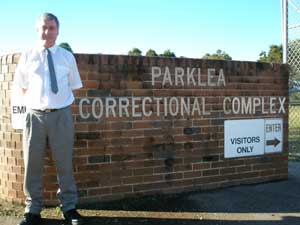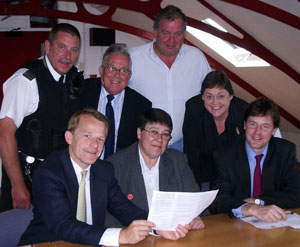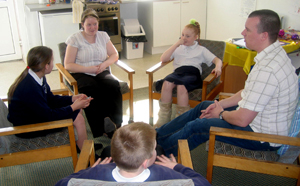News & Announcements
- Details
- Written by Joshua Wachtel
 Graham Chaseling, creator of The Game, at Parklea Correctional Complex, New South Wales, AustraliaGrahame Chaseling, a 20-year veteran of corrections in New South Wales, Australia, critic of traditional criminal justice and restorative practices devotee for over 15 years, developed a unique model for supervising adult offenders in community-based programs. He calls it The Game.
Graham Chaseling, creator of The Game, at Parklea Correctional Complex, New South Wales, AustraliaGrahame Chaseling, a 20-year veteran of corrections in New South Wales, Australia, critic of traditional criminal justice and restorative practices devotee for over 15 years, developed a unique model for supervising adult offenders in community-based programs. He calls it The Game.
Chaseling discovered the limitations of punitive justice when he began work as a prison officer. He was disturbed to see inmates stripped of responsibility and free will: “From arrest to release from the criminal justice system, whether gaol [jail] or supervision... decisions will be made for them. Things will be done to them, or required of them. In terms of fair process or meaningful engagement, the chances are that very little will be achieved.”*
- Details
- Written by Laura Mirsky
 Members of Parliament David Laws and Nick Clegg meet with Chard Police beat manager William Geddes; CICJP implementation group chair John Lacey; Avon and Somerset Police chair Henry Hobhouse; CICJP coordinator Valerie Keitch and Somerset County Councilor Jill Shortland. Photo courtesy of Chard & Ilminster News.
Members of Parliament David Laws and Nick Clegg meet with Chard Police beat manager William Geddes; CICJP implementation group chair John Lacey; Avon and Somerset Police chair Henry Hobhouse; CICJP coordinator Valerie Keitch and Somerset County Councilor Jill Shortland. Photo courtesy of Chard & Ilminster News.
The people of the neighboring towns of Chard and Ilminster, in Somerset County, England, have taken justice in their community into their own hands. They established the Chard and Ilminster Community Justice Panel (CICJP) and are handling local cases themselves, in a restorative manner, with decidedly positive results.
What makes the CICJP different from other community justice boards is the restorative process. As in restorative conferences, as practiced by the IIRP, the CICJP brings victims, offenders and their supporters together face to face to deal with the consequences of an offense and decide how to repair the harm. Victims tell offenders how they have been affected by an offense, and offenders have a chance to take responsibility and make amends. Supporters express themselves, too.
Victims, offenders and their supporters are asked a series of restorative questions. Offender questions include “What happened?” and “Who do you think has been affected by your actions?” Victim questions include “How do you feel about what happened?” and “What has been the hardest thing for you?” At the end, all participants sign a conference agreement.
- Details
- Written by Abbey J. Porter
The emotional and psychological impact of crime can last far beyond the incident itself, in some cases affecting victims’ lives for years. A groundbreaking study has shown, however, that restorative justice conferences can mitigate those effects and help victims heal and move forward more quickly.
 Dr. Caroline M. AngelDr. Caroline M. Angel, a lecturer in criminology at the University of Pennsylvania in the United States, studied the impact of restorative conferencing on post-traumatic stress symptoms in victims of burglary and robbery. Her findings were clear: Conferences reduce the psychologically traumatic effects of crime.
Dr. Caroline M. AngelDr. Caroline M. Angel, a lecturer in criminology at the University of Pennsylvania in the United States, studied the impact of restorative conferencing on post-traumatic stress symptoms in victims of burglary and robbery. Her findings were clear: Conferences reduce the psychologically traumatic effects of crime.
“The most striking thing was that conferences reduced symptoms of post-traumatic stress disorder,” she said. “What you have here is a one-time program that’s effective in producing benefits for the majority of people.”
- Details
- Written by Laura Mirsky
 Ken, a jubilant graduate of CSF Buxmont, poses with his family.On June 12, all the Community Service Foundation-Buxmont Academy alternative schools held their graduation ceremonies. I attended one at CSF Buxmont’s Woodlyn center. This was no ordinary graduation, and CSF Buxmont schools are not ordinary schools. The Woodlyn center, one of eight CSF Buxmont schools located throughout eastern Pennsylvania, USA, serves youth in grades 7-12 who, for one reason or another, are having trouble in other schools. These students have been referred to CSF Buxmont by their former schools or probation or children and youth departments, but the students themselves have made a commitment to come to CSF Buxmont and work on whatever brought them there in the first place.
Ken, a jubilant graduate of CSF Buxmont, poses with his family.On June 12, all the Community Service Foundation-Buxmont Academy alternative schools held their graduation ceremonies. I attended one at CSF Buxmont’s Woodlyn center. This was no ordinary graduation, and CSF Buxmont schools are not ordinary schools. The Woodlyn center, one of eight CSF Buxmont schools located throughout eastern Pennsylvania, USA, serves youth in grades 7-12 who, for one reason or another, are having trouble in other schools. These students have been referred to CSF Buxmont by their former schools or probation or children and youth departments, but the students themselves have made a commitment to come to CSF Buxmont and work on whatever brought them there in the first place.
There have been other eForum articles about CSF Buxmont schools and programs that readers may recall reading. (CSF and Buxmont Academy are sister organizations to the IIRP.) I wrote “A Day at a CSF Buxmont School” after visiting the Bethlehem center for the first time. I was so deeply affected by what I saw that day that I ended up leaving my job as a newspaper reporter and going to work at CSF Buxmont.
- Details
- Written by Joshua Wachtel
 John BraithwaiteOn June 16, 2006, John Braithwaite will be one of two social scientists awarded the first Stockholm Prize in Criminology from the Swedish Ministry of Justice for “outstanding achievements in criminological research or for the application of research results by practitioners for the reduction of crime and the advancement of human rights.” Braithwaite is founder and head of the Regulatory Institutions Network (RegNet) at the Research School for Social Sciences at the Australian National University (ANU) in Canberra and has been a major force in the restorative justice movement. (Co-winner of the prize is Friedrich Lösel, professor at the Institute of Criminology at the University of Cambridge, England, a leader in crime prevention research.)
John BraithwaiteOn June 16, 2006, John Braithwaite will be one of two social scientists awarded the first Stockholm Prize in Criminology from the Swedish Ministry of Justice for “outstanding achievements in criminological research or for the application of research results by practitioners for the reduction of crime and the advancement of human rights.” Braithwaite is founder and head of the Regulatory Institutions Network (RegNet) at the Research School for Social Sciences at the Australian National University (ANU) in Canberra and has been a major force in the restorative justice movement. (Co-winner of the prize is Friedrich Lösel, professor at the Institute of Criminology at the University of Cambridge, England, a leader in crime prevention research.)
David Bayley, professor and former dean of the School of Criminal Justice at University at Albany, State University of New York, co-wrote a letter of recommendation for Braithwaite as part of a nomination presented to the Swedish Ministry of Justice by Heather Strang, director of the ANU’s Centre for Restorative Justice. Said Bayley, “John Braithwaite has had the greatest impact of any criminologist in the last century. He provided the major antidote to traditional criminal justice. Some people have done some scholarship into the causes of crimes or the way criminal justice systems work. He did it all. And now restorative justice is an international movement.”
- Details
- Written by Abbey J. Porter
The studies show that conferencing can reduce victims' unresolved anger and anxiety and increase their satisfaction with the justice process.
The Jerry Lee Program on Randomized Controlled Experiments in Restorative Justice (http://www.sas.upenn.edu/jerrylee/research/rj.htm) is comparing restorative conference outcomes, for both victims and offenders, to those of conventional criminal justice practices in numerous criminal cases in Australia and the United Kingdom. Results to date confirm many conference participants’ perceptions: Restorative justice produces substantial and statistically significant benefits for victims of crime.
“The most striking finding across all our tests has been the high positive ratings that victims have given, compared to victims in court,” said lead researcher Dr. Heather Strang, director of the Centre for Restorative Justice at the Australian National University (ANU), in Canberra, and a visiting fellow at the Jerry Lee Center of Criminology at the University of Pennsylvania (Penn), in Philadelphia, USA. “They seemed to benefit at an extremely high level from the restorative justice meeting.”
- Details
- Written by Laura Mirsky
 Students at St. James Primary School participate in a restorative circle facilitated by Mark Finnis, restorative justice development officer at the Sefton Centre for Restorative Practice.The Sefton Centre for Restorative Practice has a goal—to create a restorative community. The brainchild of Sefton Youth Offending Team (YOT) manager Steve Eyre, the center may be the only building in the UK dedicated to restorative practices. (There are 154 multi-agency YOTs under the guidance of the Youth Justice Board in all of the local authorities in England and Wales, made up of representatives from probation, education, social services, health and police. Their principal aim is to stop and prevent young people from committing offenses by providing programs and interventions to both the court and the young offenders themselves.)
Students at St. James Primary School participate in a restorative circle facilitated by Mark Finnis, restorative justice development officer at the Sefton Centre for Restorative Practice.The Sefton Centre for Restorative Practice has a goal—to create a restorative community. The brainchild of Sefton Youth Offending Team (YOT) manager Steve Eyre, the center may be the only building in the UK dedicated to restorative practices. (There are 154 multi-agency YOTs under the guidance of the Youth Justice Board in all of the local authorities in England and Wales, made up of representatives from probation, education, social services, health and police. Their principal aim is to stop and prevent young people from committing offenses by providing programs and interventions to both the court and the young offenders themselves.)
For nearly two years, with training and assistance from IIRP affiliate Real Justice UK, the center’s team—including Eyre, line manager John Gibbens, restorative justice facilitator Paul Moran, restorative justice development officers Mark Finnis and Paula Downes, police officer Malcolm McConchie, senior prevention manager Carol Jenkinson, victim inclusion officers Sylvia Bouqdib and Sharon Jones and support staffer Carla Cunningham—has been implementing restorative practices across the board in Sefton.
- Details
- Written by John Boulton
The Bessels Leigh School, in Abingdon, Oxfordshire, England, a residential special school for boys with emotional and behavioral difficulties, age 11-16, has seen a remarkable change in culture, due to restorative practices.
Via restorative processes both formal and informal, the approximately 28 pupils are encouraged to express their emotions and feelings and consider those of others. In a very powerful way they are made aware of the consequences of their behavior and can recognize the harm that their actions have caused. In partnership with the IIRP and Real Justice UK and SaferSanerSchools UK, Bessels Leigh School is on track to become a demonstration school for restorative practices in the UK.
Established in 1964, Bessels Leigh School formerly served mostly pupils at the milder end of the behavioral spectrum. The philosophy was traditional, structured and authoritarian. Pupils and staff were generally happy, boundaries were not severely tested, pupil-staff relationships were mostly positive and staff turnover was low.
- Details
- Written by IIRP
This article in the UK''s Guardian newspaper reports on a survey showing that nearly two-thirds of a random sampleof 991 adult victims of crime believe that prison sentences don''tprevent reoffending. More than half favor face-to-face meetings betweenvictims and offenders, so victims can relate the impact of the crimeand offenders can take responsibility and make amends.
- Details
- Written by IIRP
A report on the conference, including a detailed conference schedule and papers related to plenary and breakout sessions.

Restorative Works Year in Review 2024 (PDF)
All our donors are acknowledged annually in Restorative Works.
